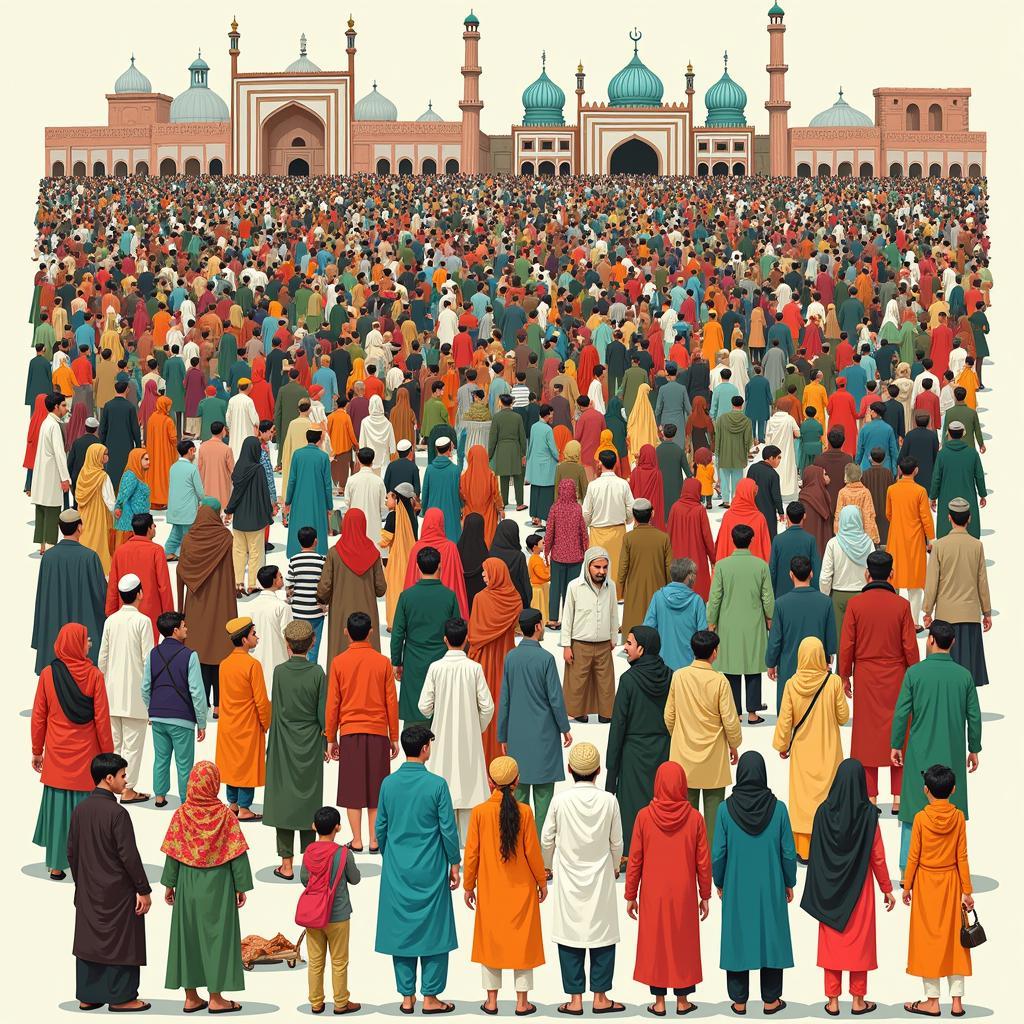Sociology, the scientific study of society, holds significant relevance in a rapidly evolving nation like Pakistan. With a complex social fabric woven from diverse cultures, religions, and socioeconomic backgrounds, understanding the dynamics of Pakistani society is crucial for addressing its challenges and unlocking its potential. This makes the Scope Of Sociology In Pakistan both vast and vital.
 Pakistani society with diverse demographics.
Pakistani society with diverse demographics.
Understanding Social Issues
One of the primary areas where sociology makes an impact in Pakistan is in understanding and addressing social issues. Issues like poverty, illiteracy, gender inequality, religious extremism, and ethnic tensions require a nuanced understanding of the underlying social structures and cultural norms. Sociologists in Pakistan conduct research, analyze data, and provide insights that can inform policy decisions and interventions aimed at creating a more just and equitable society.
Education and Research
The academic sphere offers a fertile ground for sociology in Pakistan. Universities across the country offer bachelor’s, master’s, and doctoral programs in sociology, equipping students with the critical thinking skills and research methodologies needed to analyze social phenomena. Sociological research contributes to a deeper understanding of Pakistani society and provides valuable data for policymakers and development practitioners.
 University students engaged in a sociology class.
University students engaged in a sociology class.
Development Sector
Pakistan’s development sector, comprising NGOs, international organizations, and government agencies, relies heavily on sociological insights. Understanding the needs, aspirations, and challenges of different communities is crucial for designing effective development programs. Sociologists contribute to project planning, implementation, and evaluation, ensuring that development interventions are culturally sensitive and responsive to the specific needs of the target populations.
Policy Making
Informed policy-making is essential for addressing Pakistan’s multifaceted challenges. Sociologists play a key role in providing evidence-based recommendations to policymakers. By analyzing social trends, conducting surveys, and studying the impact of policies, sociologists help shape legislation and government programs that are more likely to achieve their intended outcomes.
 A visual representation of sociological research influencing policy changes in Pakistan.
A visual representation of sociological research influencing policy changes in Pakistan.
Career Paths for Sociology Graduates
The scope of sociology in Pakistan extends beyond academia and research. Graduates with a sociology background are equipped with a unique set of skills that are highly valued in various sectors. Some potential career paths for sociology graduates in Pakistan include:
- Social Researcher: Conducting research for academic institutions, think tanks, or development organizations.
- Development Practitioner: Working with NGOs or government agencies to implement social development programs.
- Policy Analyst: Providing research and analysis to support policy development in areas like education, healthcare, or social welfare.
- Human Resources (HR): Applying sociological principles to manage workplace diversity, improve employee relations, and create inclusive work environments.
- Market Research Analyst: Utilizing sociological insights to understand consumer behavior and market trends.
Conclusion
The scope of sociology in Pakistan is vast and continuously evolving as the country navigates the complexities of the 21st century. From understanding social issues to informing policy decisions and driving development efforts, sociology plays a crucial role in shaping a more just, equitable, and prosperous Pakistan. As the country continues to develop, the demand for qualified sociologists will only continue to grow, offering promising career prospects for those passionate about understanding and addressing the challenges facing Pakistani society.
FAQs
1. What are the job prospects for sociology graduates in Pakistan?
The job market for sociology graduates is growing, particularly in the development sector, research institutions, and policy think tanks. Graduates can explore careers as social researchers, development practitioners, policy analysts, and more.
2. What skills do I need to succeed as a sociologist in Pakistan?
Essential skills include critical thinking, research methodology, data analysis, communication (both written and verbal), and a deep understanding of Pakistani society and culture.
3. What are some of the challenges faced by sociologists in Pakistan?
Some challenges include limited funding for research, political interference in academic freedom, and a general lack of awareness about the importance of social science research.
4. Can I study sociology abroad after completing my degree in Pakistan?
Yes, many international universities offer graduate programs in sociology. A Pakistani sociology degree can provide a strong foundation for further studies abroad.
5. How can I contribute to the field of sociology in Pakistan?
You can contribute by pursuing a career in sociology, supporting sociological research, advocating for evidence-based policies, or simply by raising awareness about the importance of understanding social issues.
Related Resources
For further information on sociology and related fields in Pakistan, you can explore the following resources:
Need Assistance?
For any queries or assistance, please feel free to contact us:
- Phone: +923337849799
- Email: [email protected]
- Address: Dera Ghazi Khan Rd, Rakhni, Barkhan, Balochistan, Pakistan
Our dedicated customer support team is available 24/7 to assist you.